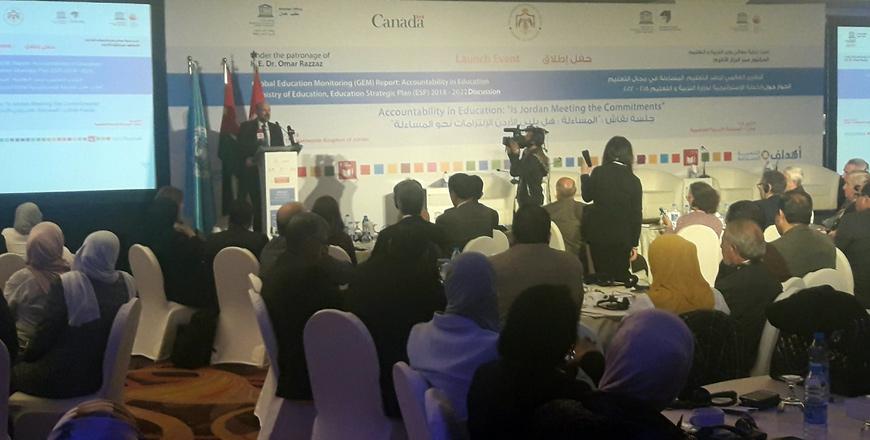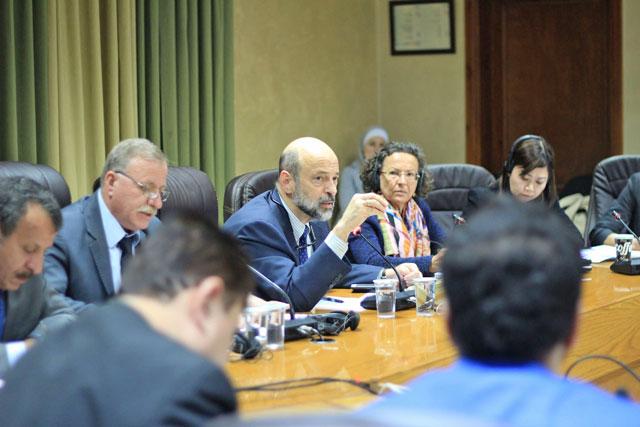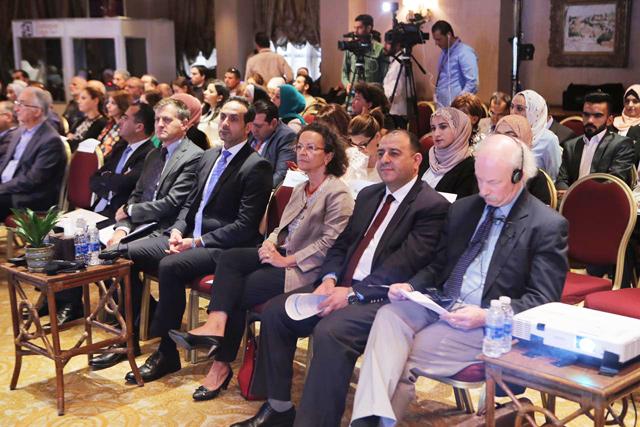You are here
‘Educational strategies cannot be attained without accountability’
By Camille Dupire - Mar 13,2018 - Last updated at Mar 13,2018
AMMAN — Representatives of the UNESCO Education Division on Tuesday presented the 2017-2018 edition of the Global Education Monitoring (GEM) report to the Jordanian public, published under the title “Accountability in education: Meeting our commitments”.
"This report is not only a very important document worldwide, but it is also a crucial complementary guide for the Education Strategic Plan [ESP] 2018-2022 launched here today," said Costanza Farina, UNESCO Representative to Jordan, at the launching event.
Launched within the context of the 2030 Agenda for Sustainable Development, the report investigates the central topic of “accountability in education”, working towards an analysis of how stakeholders can provide education more effectively, efficiently and equitably.
"Education is a shared responsibility, a collective enterprise," said Farina, noting that "as engaged partners and stakeholders — each in our own capacity and within our own responsibility — we are all accountable to ensuring a brighter educational future for this generation of students and those who will follow”.
In his opening remarks to launch the national five-year strategy, Minister of Education Omar Razzaz agreed, saying "the components of success do not only lie in the clarity of the vision — embodied in His Majesty King Abdullah's Discussion Paper — and the sense of support stakeholders receive. It is also crucial to implement monitoring mechanisms that ensure accountability, transparency and responsibility of the actors involved”.
"In every effort exerted to improve teaching and learning processes and infrastructure, each one has to be constantly held accountable and be part of a collective responsibility," stressed Jordan Naidoo, Director of the Division for Education 2030 Support and Coordination at UNESCO HQ in Paris.
During a briefing on the main findings and key messages emanating from the report, Naidoo highlighted the importance of monitoring and accountability as means to implement national plans like the ESP.
"Having a plan is the first step towards success, but it needs to be accompanied by appropriate laws and regulations that help sanction malpractices, ultimately empowering the actors in achieving SDG 4 targets," he continued.
"When speaking about accountability, we discuss that of the government, schools and teachers — of course — but must also consider the accountability of citizens and civil society organisations, parents, media, the private sector, the international community and UN organisations," said Farina, underscoring that "all SDGs are deeply connected and need high levels of trust among actors”.
She noted that the ESP should be viewed as a "living document" to be monitored and updated annually, referring to a workshop on Wednesday that will aim at defining the parametres of the ESP monitoring and evaluation framework.
Commending the Ministry of Education's efforts in continually improving the sector and opening access of quality education to the largest numbers, Farina said: "I would like to celebrate the collective efforts of all those involved in the drafting of those two documents, as well as the Minister’s steadfast vision for the future of education in Jordan."
She praised the "strong leadership" of the MoE, stressing that it greatly contributed to "the profound collaboration that underpinned the conception, development and realisation of the ESP".
Related Articles
AMMAN — The Ministry of Education (MoE) in collaboration with the UNESCO Amman office on Tuesday launched the Education Strategic Plan (ESP)
AMMAN — Following the launching event of the Education Strategic Plan 2018-22 a day earlier, the Ministry of Education (MoE) on Wednesday ho
AMMAN — “My experience and what I learned from the Support to Media in Jordan is only the beginning of what is waiting ahead of me in my new














